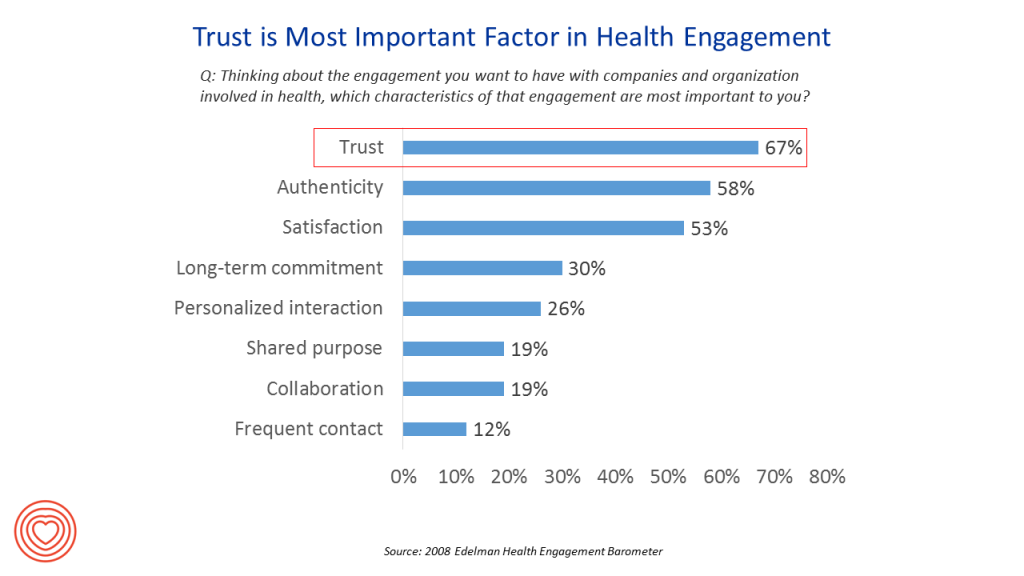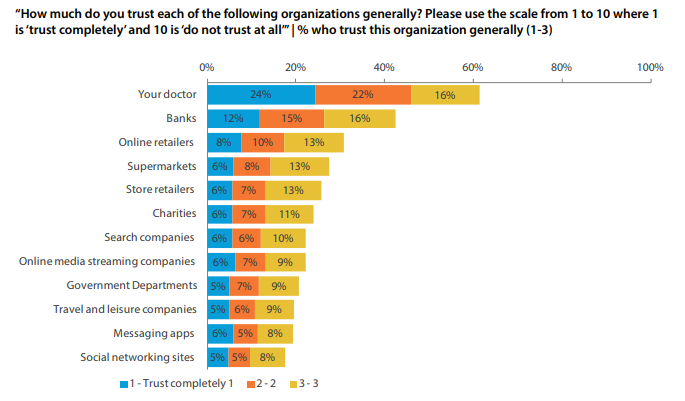 Trust is a precursor to health engagement, I learned way back in 2008 when I collaborated with Edelman on the first Health Engagement Barometer in 2008. This chart illustrated data from that survey, showing that trust, authenticity and satisfaction were the top three drivers among consumers looking to engage for health.
Trust is a precursor to health engagement, I learned way back in 2008 when I collaborated with Edelman on the first Health Engagement Barometer in 2008. This chart illustrated data from that survey, showing that trust, authenticity and satisfaction were the top three drivers among consumers looking to engage for health.
 I attended the annual 2019 HIMSS conference in February for nearly a week of meetings, interviews, education sessions, company private salons, and social media check-ins with my fellow and sister HIMSS Social Media Ambassadors. One of the SMA objectives is to consider the Conference in advance and offer thoughts about what we’ll expect, which I did here in the HIMSS blog space. I anticipated we’d see a lot of tools and techs to support patients seeking support for accessing and paying for more affordable care.
I attended the annual 2019 HIMSS conference in February for nearly a week of meetings, interviews, education sessions, company private salons, and social media check-ins with my fellow and sister HIMSS Social Media Ambassadors. One of the SMA objectives is to consider the Conference in advance and offer thoughts about what we’ll expect, which I did here in the HIMSS blog space. I anticipated we’d see a lot of tools and techs to support patients seeking support for accessing and paying for more affordable care.
And we did indeed, from the visible presence of Lyft to help solve the social determinant of health factor of transportation, revenue cycle management tools to address patient payment plans, and a proliferation of telehealth vendors extending services to people where they live and work, 24×7.
This week, HIMSS published my retrospective thoughts on the Conference. Seeing AWS (Amazon Web Services) and Google Cloud in large booth spaces on the exhibitor floor space was a visual confirmation that health care IT is now more about data than technology. The cloud and FHIR standards are fostering a new era of interoperability in health care.
Harnessing peoples’ data-for-good has an obvious upside for individual patient care, clinical trials and research, and crowdsourcing cures for diseases, both rare and epidemic.
We can’t be all that sanguine about “data as the new oil” for improving health care: privacy and security concerns loom large in the post-Facebook/Cambridge Analytica era, along with perennial cyber-breaches of patients’ personal health information.
Furthermore, data can be scraped for all kinds of purposes, outside of the context of health care in which patients and health consumers originally share their data. This week, Senator Ron Wyden (D-OR) and colleagues introduced the Algorithmic Accountability Act with the intent to ensure that computer algorithms are designed to be fair, accurate, unbiased, avoiding discrimination.
Read my post for more context and details into my post-HIMSS 2019 thinking on trust in data stewardship. As the chart from Acxiom clearly illustrates, consumers most highly trust their doctor for taking care of their data more than banks, retailers, or grocers. That trust is healthcare providers’ to lose, and with it, patients’ ability to increasingly open new front doors to health care outside of the legacy system.





 Interviewed live on BNN Bloomberg (Canada) on the market for GLP-1 drugs for weight loss and their impact on both the health care system and consumer goods and services -- notably, food, nutrition, retail health, gyms, and other sectors.
Interviewed live on BNN Bloomberg (Canada) on the market for GLP-1 drugs for weight loss and their impact on both the health care system and consumer goods and services -- notably, food, nutrition, retail health, gyms, and other sectors. Thank you, Feedspot, for
Thank you, Feedspot, for  As you may know, I have been splitting work- and living-time between the U.S. and the E.U., most recently living in and working from Brussels. In the month of September 2024, I'll be splitting time between London and other parts of the U.K., and Italy where I'll be working with clients on consumer health, self-care and home care focused on food-as-medicine, digital health, business and scenario planning for the future...
As you may know, I have been splitting work- and living-time between the U.S. and the E.U., most recently living in and working from Brussels. In the month of September 2024, I'll be splitting time between London and other parts of the U.K., and Italy where I'll be working with clients on consumer health, self-care and home care focused on food-as-medicine, digital health, business and scenario planning for the future...